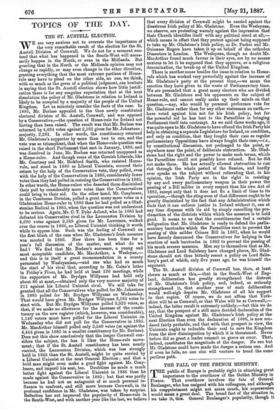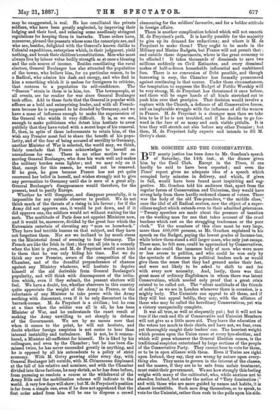THE FALL OF THE FRENCH MINISTRY.
T"public of Europe is probably right in attaching great importance to the overthrow of the Goblet Ministry in France. That overthrow involves the fate of General Boulanger, who has resigned with his colleagues, and although his reappointment might not mean much, his supersession would mean a great deal. The broad fact of the situation is, we take it, this. General Boulanger's popularity, though it may be exaggerated, is real. He has conciliated the private soldiers, who have been greatly neglected, by improving their lodging and their food, and relaxing some needlessly stringent regulations for keeping them in barracks. These orders have, moreover, pleased the peasants whose sons the conscripts are, and who are, besides, delighted with the General's known dislike to Colonial expeditions, enterprises which, in their judgment, yield nothing, and break their children's constitutions. Men who must always live by labour value bodily strength as at once a blessing and the sole source of income. Besides conciliating the rural electors, General Boulanger has also attracted the population of the towns, who believe him, for no particular reason, to be a Radical, who admire his dash and energy, and who find in him a something which it is useless for foreigners to criticise, that restores to a population its self-confidence. The " Gascon " strain in them is in him, too. The townspeople, at all events, are far readier for war since General Boulanger took office. Add to these facts that the General is popular with officers as a bold and enterprising leader, and with all French- men because he is supposed to be dreaded by Germany, and we have a mass of influence enough to make the supersession of the General who wields it very difficult. It is, as we see, enough to make politicians who detest him hesitate to avow publicly that they have voted with a secret hope of his removal. If, then, in spite of these inducements to retain him, of the wish any Premier must feel to share the benefit of his popu- larity, and of the fear of being accused of servility to Germany, another Minister of War is selected, the world may, we think, fairly conclude that. France acknowledges to herself an unreadiness for war. There is no other motive for re- moving General Boulanger, who does his work well and makes the military burden seem lighter ; and we may rely on it that, except for this reason, he would not be removed. If he goes, he goes because France has not yet quite recovered her belief in herself, and wishes strongly not to give any provocation to Germany until she is sure of a great ally. General Boulanger's disappearance would therefore, for the present, tend to pacify Europe. Whether he will disappear, and disappear peacefully, it is impossible for any outside observer to predict. We do not think much of the threats of a rising in his favour ; for if the Army did not approve one, it would be put down, and if it did approve one, the soldiers would act without waiting for the mob. The multitude of Paris does not appoint Ministers now, and it would be, moreover, divided by the great fear which the Extremists entertain of elevating any "man on horseback." They have had terrible lessons on that subject, and they have not forgotten them. Nor are we inclined to lay much stress on the Ministerial dread of seeming to fear Germany. The French are like the Irish in that ; they can all join in a comedy when the hint is given, and M. de Freycinet would soon hint to them that he was only biding his time. But we do think any new Premier, aware of the composition of the Chamber, and of the dreadful preponderance of chances against any Ministry whatever, will hesitate to deprive himself of the aid derivable from General Boulanger's popularity, and will think with discomposure of the irrita- tion which, even if they submit, the peasant electors will feel. We have a doubt, too, whether observers in this country quite appreciate the weight of the Army in France, or the reluctance of any Minister to take power with the Army seething with discontent, even if it be only discontent in the barrack-rooms. M. de Freycinet is a civilian ; but he rose at a time when the soldier was all in all, he has been Minister of War, and he understands the exact result of snaking the Army unwilling to act sharply in defence of the Government. We are by no means sure that when it comes to the point, he will not hesitate, and doubt whether foreign suspicion is not easier to bear than internal instability and turbulence. He is not, be it remem- bered, a Minister all-sufficient for himself. He is liked by his
colleagues, and even by the Chamber ; but he has been dis- missed twice, he has never succeeded greatly in anything, and he is opposed by all his antecedents to a policy of strict economy. With M. Gre'vy growing older every day, with General Boulanger left outside, with M. Clemencean displeased at the fall of his relative and nominee, and with the Chamber divided into three factions, he may shrink, as he has done before, from pursuing so resolute a course as the withdrawal of the Army Bills and the mobilisation scheme will indicate to the world. Avery few days will show; but M. de Freycinet's position is far from a simple one, even if he does not apprehend that the first order asked from him will be one to disperse a crowd clamouring for the soldiers' favourite, and for a bolder attitude in foreign affairs.
There is another complication behind which will not smooth M. de Freycinet's path. It is hardly possible for the majority to give up its demand for reductions ; and where is M. de Freycinet to make them I They ought to be made in the Military and Marine Budgets, but France will not permit that ; and outside those departments, where is the great economy to be effected ? It takes thousands of dismissals to save two millions suddenly on Civil Estimates, and every dismissal makes of half-a-dozen households influential and embittered foes. There is no conversion of Debt possible, and though borrowing is easy, the Chamber has formally pronounced against continuing in that course. Under these circumstances, the temptation to suppress the Budget of Public Worship will be very strong, M. de Freycinet has threatened it onoe before, and there will be eager hands of all kinds stretched out to push him over that precipice. That decision would involve a rupture with the Church, a defiance of all Conservative forces, and an implacable struggle with the influence of all the women in France. M. de Freycinet is a stronger man than we take him to be if he is not troubled, and if he decides to go for- ward in the face of so many and such visible pitfalls. It is true they will stretch out also before any other Premier ; but then, M. de Freycinet fully expecte and intends to fill M. Grevy's chair.



















































 Previous page
Previous page